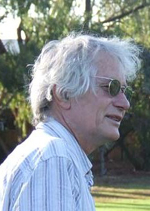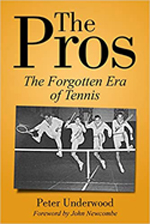Free Fall
Peter Underwood

By the time Bill Tilden was forty he was leading a double life. One on the tennis stage with remnants of glory, the other off the stage and inglorious.
Off the stage he was pursuing a string of older boys and teenagers in a demimonde of furtive, risky, illegal and profoundly unsatisfactory liaisons.
Barry Unsworth's haunting novel, Morality Play, about a troupe of medieval players comes to mind. Unsworth gives these lines to one of the novice actors: "Now it came to me. The player is always trapped in his own play but he must never allow the spectators to suspect this, they must always think that he is free. Thus the great art of the player is not in showing but concealing."
Bill Tilden was trapped in his own play while trying to convince the audience he was free. But the trap was closing and his efforts to convince rang more and more hollow. For this player was doubly bound –as performer on stage and performer off it. Big Bill could never really come to terms with himself and who he was. Says biographer Frank Deford so aptly: it was as if he thought he was just "a wrong call."
Eventually, Tilden became a man whom he himself despised, so much so that soon he couldn't care for himself. Banned, he was unable to play or teach. Who wanted an ex-con pedophile who smelled bad? Thus he was denied his tennis-- the only thing he loved, the only thing imparting meaning to his devastated internal world.
Two Letters
Here are excerpts from two letters. They were written when, for once, the mask had slipped a little from his face, the first and most tragic of our pro champions.

Biographer Deford located the first, written just a few weeks before Tilden died in 1953. It was to Vincent Richards, his old doubles partner.
Vinnie had remained one of Tilden's few friends. Tilden writes: "Vinnie, could you please send me a couple of dozen balls and a racket or two? If I had them I think I could get some lessons. I need the money badly."
The second letter from Tilden surfaced recently, and dates from a few years earlier than the first. It was addressed to his then current young buddy, Arthur Anderson, aged 16. Tilden dedicated his final book, written just before he died, to Arthur.
The notepaper is headed Hotel Fontanelle in Omaha, Nebraska and dated February 10, 1946. Tilden, then fifty-three, was on tour, in the freezing sticks.
It read: "Dearest Stinky, I am crazy about my beautiful shirt and thank you very much.
Your letter was here when I arrived and was welcome for I was missing my brat. I wish you had been here last night. We had quite an evening. We were playing on wood under bad lights and I'll tell the world it's tough.
"Carl Earn went crazy against a bad Riggs and nosed him out in a very excellent match 7-5, 6-8, 6-4. Riggs was lucky to win the 2nd set but then had the match in hand at 4-3 40/30 on his own serve in the third set but blew it. Earn really played well. Riggs underestimated him.

"Bobby Harman had me in serious trouble in our match. He won the first set 6-2, had me down 0/40 at 1 all in the 2nd, and had 15/40, 0/30 and 30/40 on my next three service games but I was getting better, and I won 2-6, 6-3, 6-2.
"Give my love to the family. I'll write soon. I miss you, Stinky. Play lots of good tennis. Love always, Your old man Bill."
The reader of such a letter is moved to ask: how much pain did this person--described by a fellow pro as "this strange man whom no one understands" have to bear for the loss of his family? And how much did he rue never having a son?
Bill Tilden died on June 6, 1953. He was the exact same age-- sixty years and four months -- as his own father when he died.
Loves Beckoning
But in those last June days before Big Bill's great heart finally gave out, things appeared to be looking up. In his autobiography, probably written in jail just a little earlier, Tilden tells how much he still longed for the brightness.
At least now he could see a patch of it. For the first time in years, he had been accepted into the US Pro Championships.
Furthermore, before play started a couple of weeks later in Cleveland, he had managed to snare some exhibitions and paid teaching sessions along the way.
This is why he had so desperately needed the balls and rackets from Vinnie Richards. He had already started practicing.
The stage. His art. His loves were beckoning. Big Bill was raring to go. By then Tilden was living alone in a tiny rented apartment in Los Angeles. The loyal Anderson family kept an eye on him, and after he had practiced in the morning with young Arthur, they had invited him to dinner for the following day.

But the next evening he hadn't appeared, so Arthur went to his apartment to find him. Amongst other personal idiosyncrasies, Tilden had a habit of getting ready early.
Then, fully clothed, he would lie on his bed awaiting his departure. When that moment came, he would put on his shoes and, if it was winter, his famous, but now reeking, camelhair overcoat before leaving.
It was thus, stretched out dead, that they found him. Beside him was a small bag, packed and ready with his tennis gear. His two rackets were beside it. They were his only rackets; the gift of Richards, sent to him as requested a few days before. Once again, Big Bill Tilden was ready to play. Then his heart gave out.





